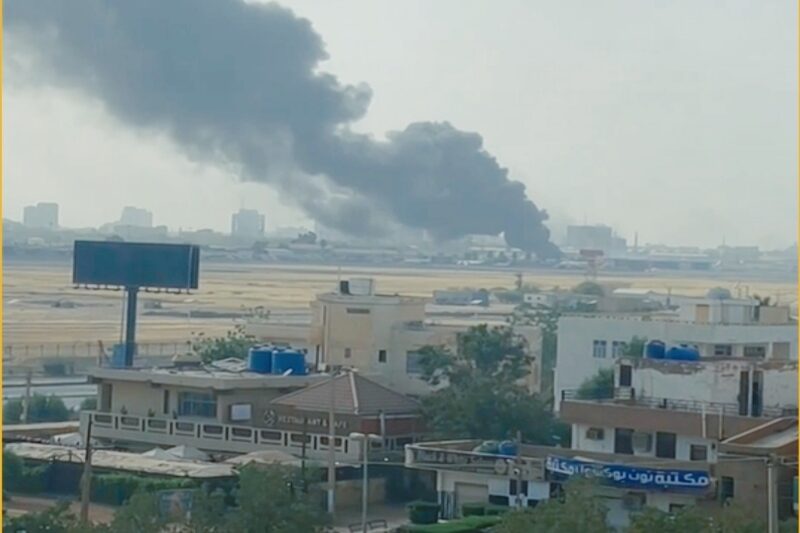Many Nigerian students – most of them from Borno State in the northeast – are trapped in Khartoum, the capital of Sudan, and in other parts of the country, where fierce fighting has broken out between the Sudanese military junta and the country’s most powerful paramilitary troops known as the Rapid Support Forces (RSF).
The fighting began on Saturday, April 15. It followed weeks of tension over the proposed integration of the RSF into the military. The conflict and power struggle between the rival forces are increasing the risk of a nationwide civil war.
Both Abubakar Sadiq Wajiro, the president of the National Union of Borno State Students (NUBOSS), and Bashiru Saidu Muhammad, the president of the National Association of Nigerian Students in Europe (NANSE), have called on President Muhammadu Buhari to make arrangements to ensure the safety of the Nigerian students and to get them out of Sudan as quickly as possible.
Muhammad said the students needed to be evacuated immediately and the federal government should provide them with adequate support and resources to continue their education, adding that the conflict in Sudan should not “rob these students of their future”.
He urged the federal government to act “swiftly and decisively”.
Wajiro told RNI that since the fighting began, the union had been in contact with students, mostly with those from Borno State, who are studying at various universities across Sudan.
“Based on the information we received, the students are in a precarious and dangerous situation. They cannot access food, water and healthcare services. Thank God, so far, none of the students has been wounded or killed.
“The Nigerian government, through its embassy in the country, and the Sudanese government need to protect the lives of the students. I believe that the federal government has a database of the students and Nigerian nationals in the country. It is imperative for the Nigerian government and the Borno State government to identify and locate the students so that they can be evacuated and brought home safely. Until then, it is extremely important for the government to provide them with maximum security and ensure they can access food, water and medicine.”
Mallam Garba Shehu, Buhari’s spokesman, said in a statement that the president and Chad’s Transitional President Idriss Déby-Itno had met on Sunday. Both leaders condemned the ongoing fighting.
The two leaders had “reviewed the unfortunate situation and called on all neighbouring countries and the international community to prevail on the warring sides to stop fighting and negotiate”, said Shehu.
Déby-Itno described the situation as worrisome and said the borders between Chad and Sudan had been closed. Security had also been beefed up.
Mohammed Donuma, a student from Borno State, who is studying medicine and surgery at the National University of Jami Al Wataniyya in Khartoum, told RNI that the situation in Sudan was “critical” and that Nigerian students needed to get out of the country as soon as possible.
“We are panicking. We continue to hear the sounds of gunshots, artillery, explosions and rocket launchers. Some of us are experiencing heart palpitations. The female students are particularly stressed. The gunfire keeps intensifying. We are staying indoors at our various hostels with limited access to food, water and healthcare services.
“In fact, it is extremely difficult for us to have a meal to break our fast because we do not have food. Some shops around the area are open but we cannot get enough food. Instead, we eat a little bread and have water as our pre-dawn meal [Suhur] before fasting.
Donuma said there were many Nigerian students in Sudan, most of them from Borno State.
“The lives of many students are at risk, particularly those who are studying at universities that are close to military bases. The Nigerian embassy in Khartoum did not react until today [Tuesday, April 18] when it announced that all Nigerian nationals in Sudan were advised to stay indoors and calm. The embassy said it was monitoring the situation.
“We are begging both the federal government and the Borno State government to take all the necessary measures to ensure our safety here in Khartoum or to find a way to evacuate us safely, if the fighting gets worse. May Allah protect us all,” Said Donuma.
Hajja Zainab Mustapha, a resident of Maiduguri whose son is studying in Khartoum, said: “I have a son studying in one of the universities in Khartoum. I have not heard from him since the fighting began. I just hope he is safe.
“I am begging the federal government to do what it can to protect not only the students but also Nigerian nationals living in Sudan. Because so many of the students are from Borno State, I am also calling on governor Babagana Umara Zulum and other state officials to look into the matter to ensure that our children are safe.”
News agency Reuters said on Wednesday, April 19, that air strikes and explosions continued in Khartoum after a US-brokered ceasefire between the army and the paramilitary forces failed.
“Continuous bombardments and loud blasts could be heard in central Khartoum in the area around the defence ministry compound and the airport, which has been fiercely contested and put out of action since fighting erupted at the weekend,” it said.
The World Health Organisation (WHO), citing Sudan’s health ministry, said at least 270 people had been killed and more than 2,600 people injured in the fighting. It said three employees of the World Food Programme (WFP) had died on Saturday in violence in Kabkabiya, North Darfur. Two others were wounded in the same incident.
The WHO said Sudan’s warring sides had seized ambulances and that the violence had forced hospitals to shut down.
“The health system in Sudan has been very fragile for years. Now, the armed conflict between the two parties has led to hospitals being out of service and staff shortages,” Ahmed Al-Mandhari, the WHO regional director for the eastern Mediterranean, told Al Jazeera.
SHETTIMA LAWAN MONGUNO









